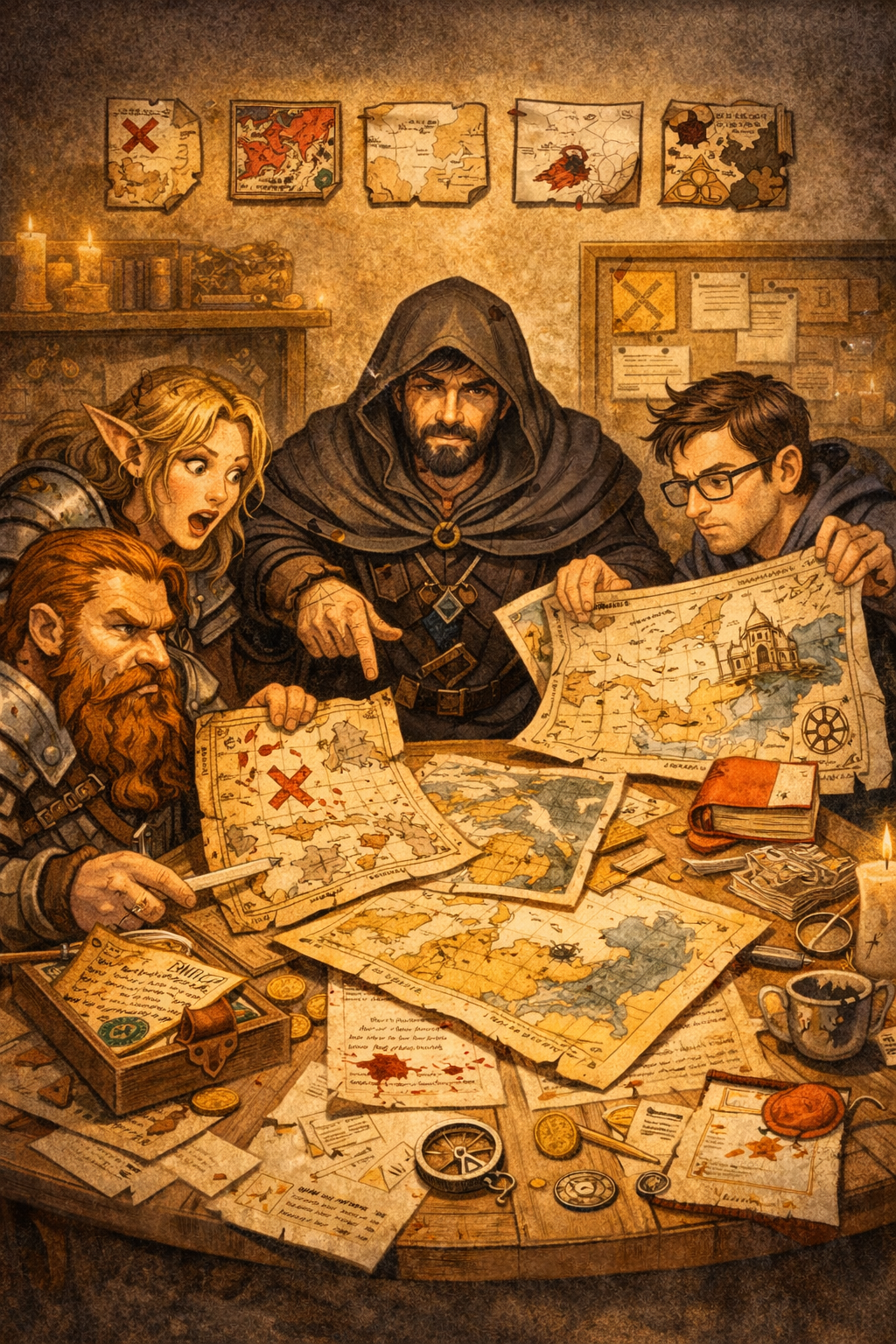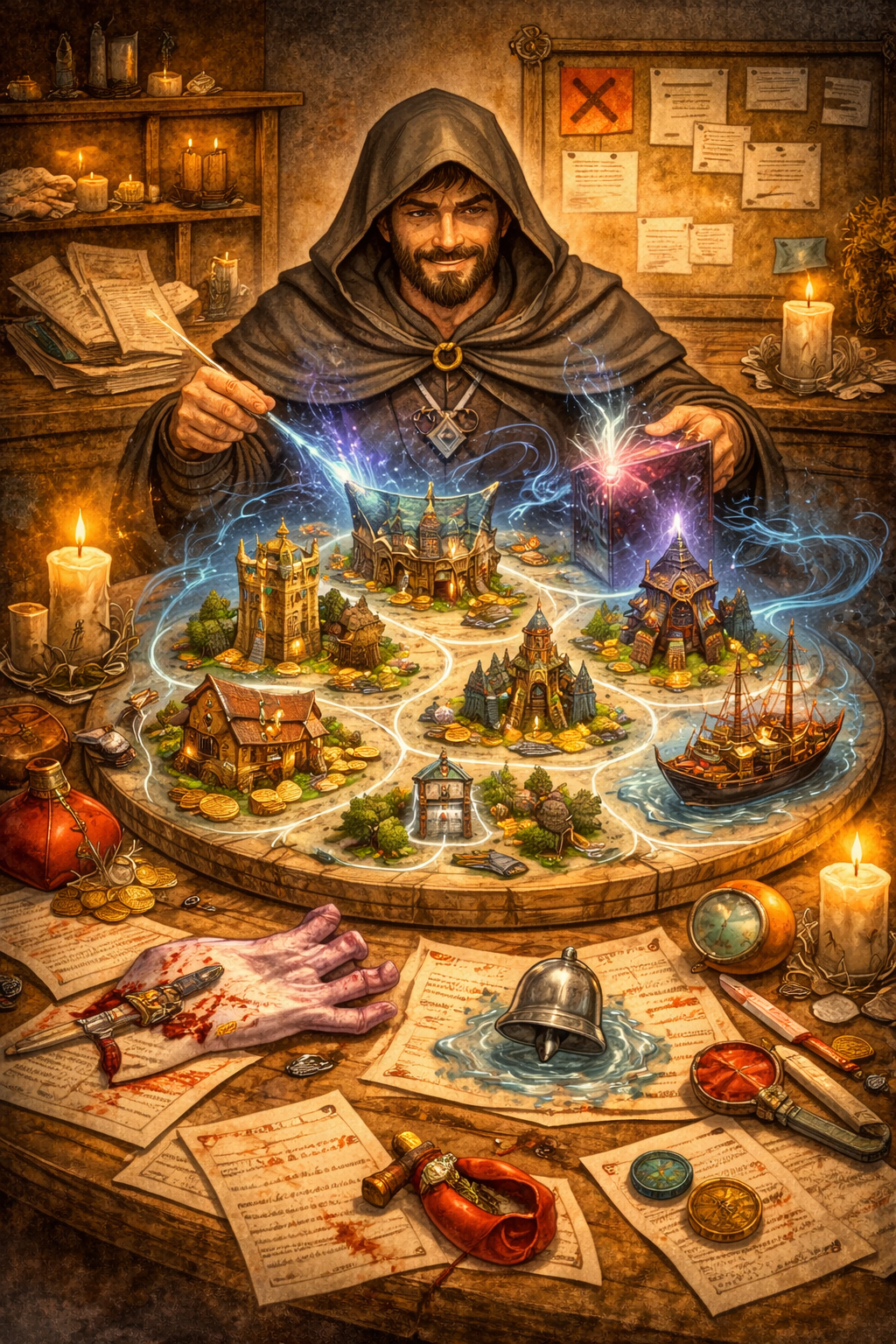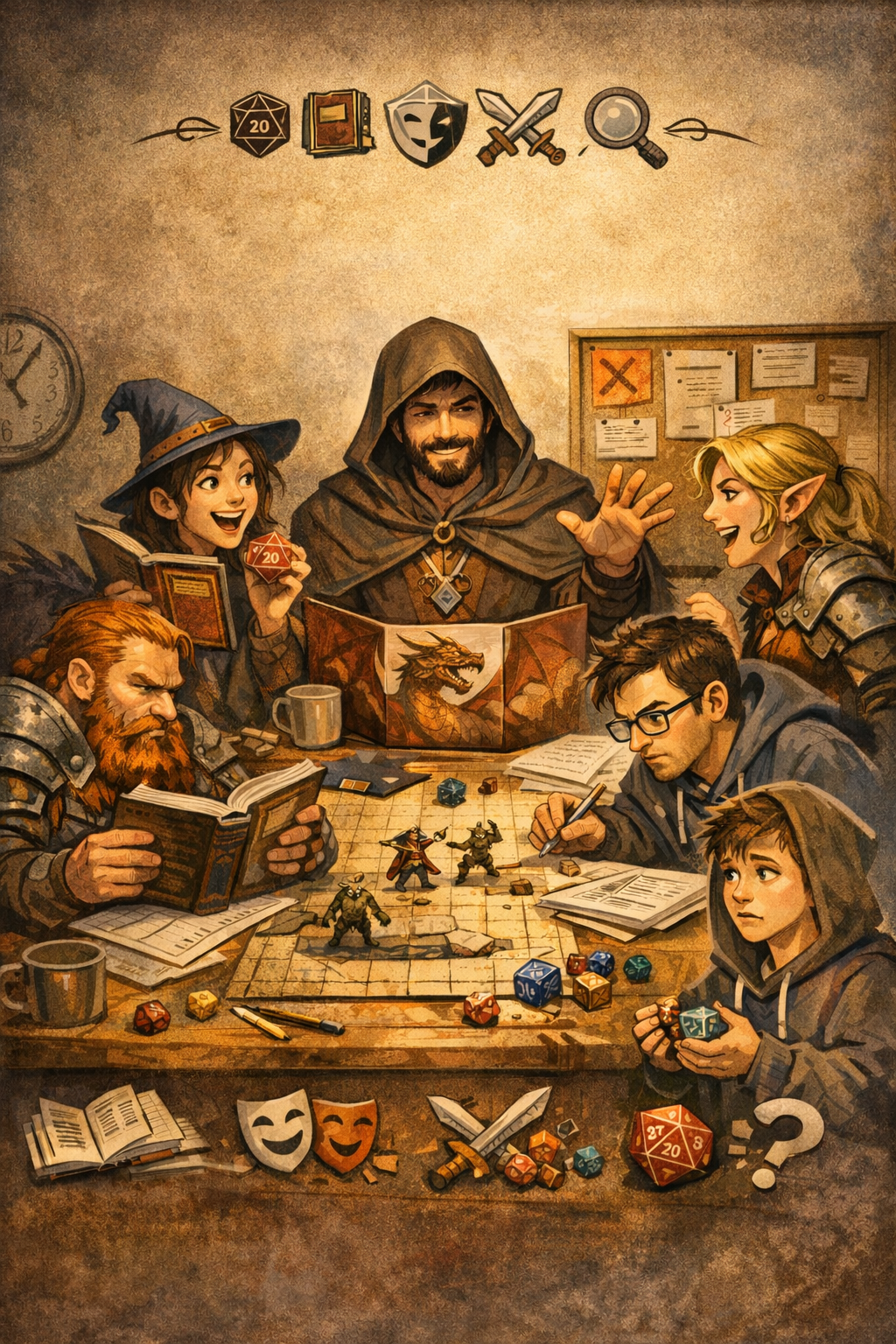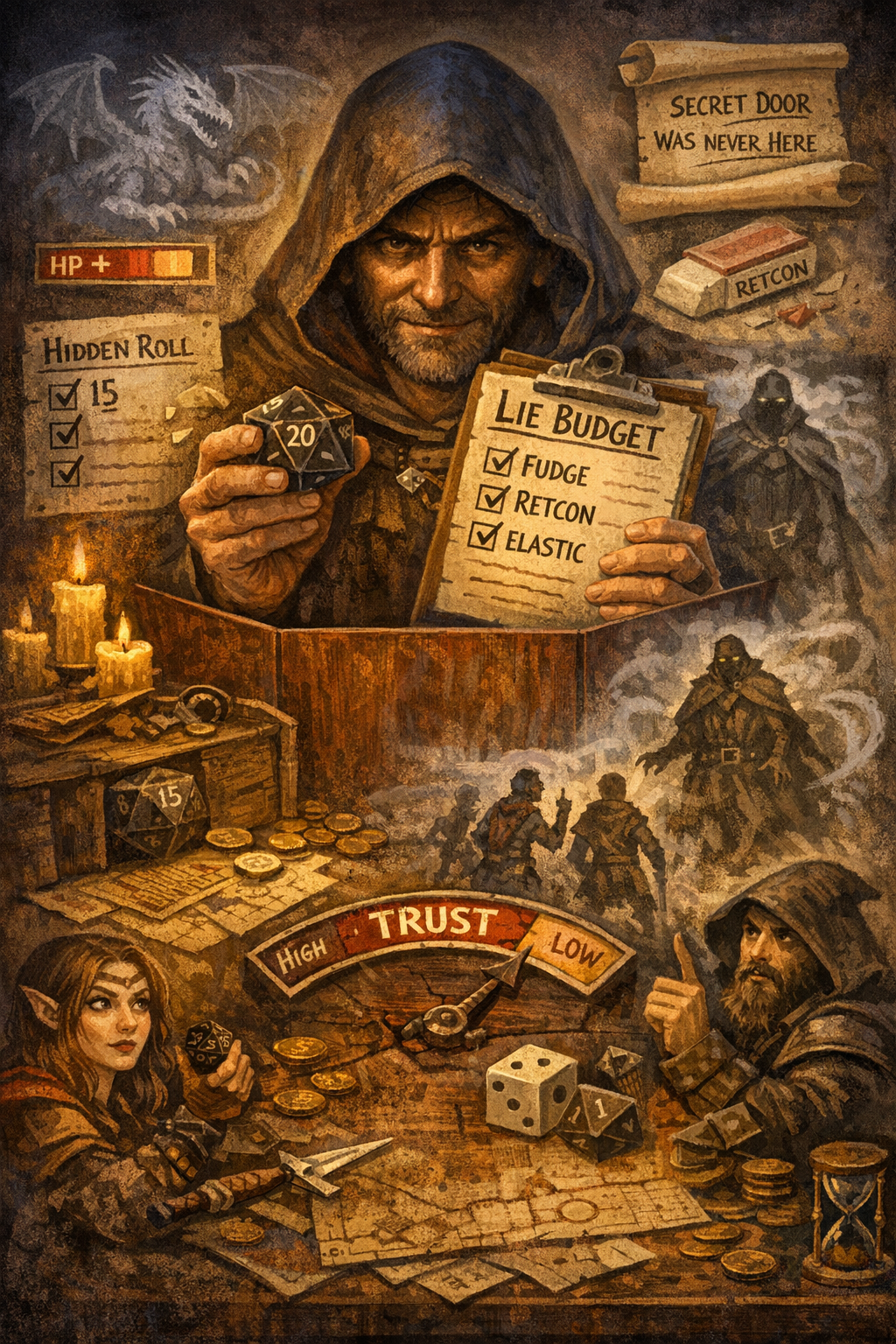The Ethics of Enchantment: When Spells Cross Moral Lines
When Enchantment crosses a line
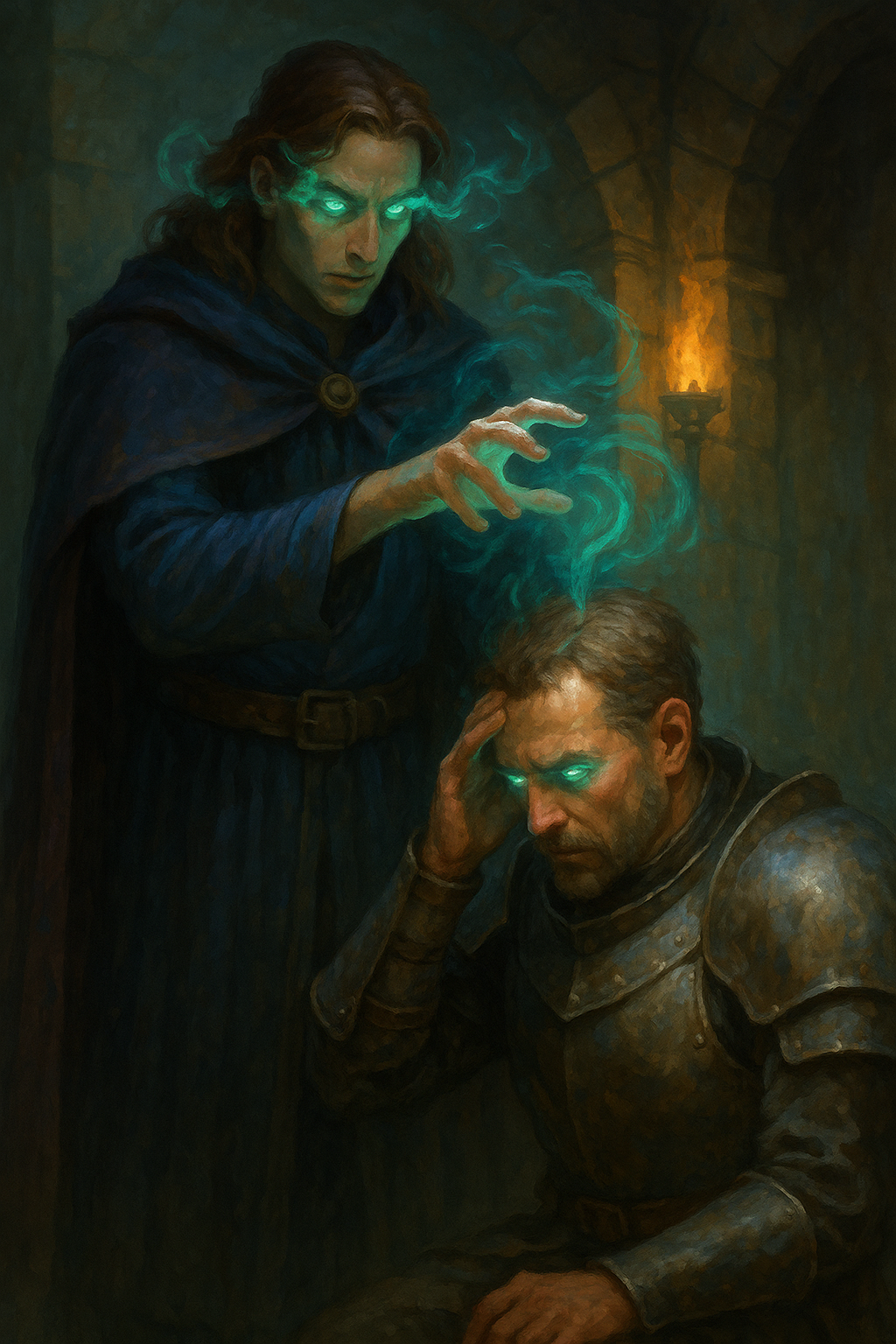
Dear Readers,
There is a particular kind of quiet that falls over a table when someone casts an enchantment spell. Not the bright excitement of a Fireball, nor the tense anticipation of a Misty Step escape. Enchantment produces a different flavor of silence — the kind that follows a character choice that feels a little too close to the real world.
Because enchantment isn’t about bending reality. It’s about bending someone.
And whenever power touches the soul rather than the stone, questions begin to bloom.
Dungeons & Dragons gives adventurers an extraordinary amount of influence. They can cleave mountains, command storms, open portals to forgotten eras — all impressive, all dramatic. But none of these spells intrude the way Charm Person does, or Suggestion, or Dominate Person. Those are not spells that create force. They are spells that create compliance.
And whenever free will becomes flexible, ethics become unavoidable.
Today we explore what lies under the surface of those spells we call “convenient,” “tactical,” or “crowd control”— the spells that give your heroes the ability to alter hearts, rewrite loyalty, or even erase memory. Not to shame their use, but to enrich the story they create.
Let us walk into the school of enchantment, where nothing burns except the boundaries between self and other.
What Makes Enchantment Different
Most types of magic reshape the physical: fire, stone, shadow, time. Enchantment reshapes the mental.
Fireball does not ask who you are.
Lightning Bolt does not care about your opinions.
Hold Person does not negotiate your beliefs.
But enchantment does. It touches the private chambers of the mind where choices are made.
That intimacy is what makes enchantment uniquely powerful and uniquely dangerous. When you force a hand with brute strength, the world sees violence. When you force a mind with magic, the world may see nothing at all. And hidden harm is often the easiest to justify.
In game terms, enchantment provides advantage in social or strategic encounters. In narrative terms, it asks a silent question: Do you believe someone else’s freedom is negotiable when you need something?
That question sits at the heart of this entire discussion.
The Fine Line Between Influence and Intrusion
Every bard and silver-tongued rogue already knows how to influence. Speech, charisma, music — these are tools of persuasion. They offer choices, even if they stack the deck.
Enchantment is not persuasion. It is intrusion.
A merchant persuaded to give a discount might later feel fooled or impressed.
A merchant charmed into giving that discount never had a say.
And that difference is what elevates enchantment from game mechanic to moral crossroad.
Enchantment changes the internal architecture of thought. The target’s mind is still present, but the foundations of certainty have shifted. They feel what the spell wants them to feel. They trust what the spell wants them to trust. They obey what the spell wants them to obey.
Some players see this as simple optimization. But inside the world, this is psychic trespass.
Your character may not be evil for using enchantment, but your world should treat enchantment as something worthy of discussion.
Consent and the Spell List
Consent in magic is rarely discussed at tables, but it exists at the center of enchantment whether a group acknowledges it or not. The target of Charm Person does not agree to the charm. The target of Dominate Person certainly does not.
Consent is irrelevant mechanically.
But it is always relevant ethically.
It is worth considering these questions when enchantment appears at the table:
- Does saving someone justify removing their agency?
- If the target never learns they were controlled, is it still a violation?
- If the target thanks the caster afterward due to the spell’s influence, does that gratitude matter?
- Does intent soften the intrusion? Or does intrusion always corrupt the intent?
Your characters may not have answers. Their struggle to answer is the story.
Why Players Use Enchantment
The typical explanations for enchantment fall into familiar territory:
It avoids violence.
Charm instead of stab. Suggest instead of threaten. But just because bloodshed is prevented does not mean harm is avoided.
It’s efficient.
A Suggestion spell can skip entire plot arcs. No need to bargain or infiltrate — just compel cooperation.
It’s humorous.
Making a guard believe you’re old friends can be funny, even charming in its own way.
It’s tactical.
The battlefield version of enchantment turns enemies into unwilling weapons.
None of these reasons is inherently immoral. But all of them risk forgetting that the creature being influenced is a person with a mind that did not ask to be rewritten.
The best campaigns highlight this tension. They don’t villainize enchantment users — they give them something worth wrestling with.
The Invisible Wound
Damage is easy to see. A sword makes a gash. A spell leaves scorch marks.
Enchantment leaves neither.
Its wounds are in the mind.
A dominated captain might awaken days later and realize she led her troops into a slaughter she never wanted. A charmed nobleman might discover his trust was manufactured and feel ashamed rather than angry. A terrified prisoner might find his memories altered and no longer know which fear is real.
Enchantment can save lives. It can also fracture identities.
Some DMs hand-wave this. That’s fine — not every game needs heavy philosophy. But for tables that enjoy drama, this is fertile ground.
Imagine a former victim tracking down the party, not for revenge, but for answers:
“Why did I trust you? Why does it still hurt?”
Such moments live long in memory, far longer than the enchantment itself.
Alignment and Enchantment
The alignment system in D&D tries to simplify morality into compass points. But enchantment complicates those lines beautifully.
A lawful good paladin who would never steal might cast Command to force surrender. Is coercion righteous? They might say yes: it preserves life. Their god might disagree.
A chaotic neutral bard might charm a guard without blinking but refuse to cast Dominate Person. Freedom matters to them — but not enough to skip inconveniences.
A neutral evil wizard might avoid mind-control entirely, not out of compassion, but because they consider it aesthetically distasteful or too risky politically.
Enchantment exposes that alignment is not morality — it’s philosophy. And philosophy grows richer when characters must defend their choices to each other.
Cultures and Social Norms Around Enchantment
Imagine a world where enchantment is not simply a school of magic but a cultural debate. How does society respond?
Some ideas to explore:
The Theocracy of Clear Thought
A church that declares enchantment a sin equal to murder. They may preach that the mind is sacred and untouchable.
The Empire of Rational Law
Courts regularly use charm spells during trials. Truth is not discovered; it is extracted.
The Bardic Confederation
Bards use enchantment as art. Audiences willingly enter magical performances knowing emotional influence is part of the craft.
The Kingdom of Memorykeepers
A mage order monitors misuse of memory spells like Modify Memory, treating them as crimes of identity erasure.
The Feywild Courts
Consent exists, but their definition differs wildly, creating moral tension for mortals.
Different societies create different consequences. Your players’ actions will matter more if the world has opinions.
Charm Person: The Most Misunderstood Spell in the Game
Charm Person seems harmless. Low-level. Low-stakes. Practically a party trick.
But the effect is subtle and deeply personal. The target believes the caster is a friend.
They experience false intimacy.
When it wears off, they learn the truth: their emotions were not emotions — they were magically induced illusions. That betrayal stings with a very human pain.
In storytelling terms, Charm Person is emotional forgery. It simulates a bond without the work that bond requires.
A merchant might forgive such deceit. A grieving widow might not. A king might see it as treason. A child might never trust again.
The question is not what Charm Person can accomplish. The question is what it costs.
Suggestion: The Silver Blade
Suggestion is the quiet assassin of free will.
It does not shout. It does not force. It whispers logic into a mind until obedience feels like the target’s own idea.
It is elegant magic.
It is also profoundly manipulative.
A Suggestion that prevents violence can be an act of mercy. A Suggestion that bends loyalty becomes corruption. A Suggestion that leads to romantic involvement crosses into violation.
The beauty of Suggestion is that its morality depends entirely on how the caster frames it. “Why don’t you run?” can save a life. “Why don’t you give me everything you own?” destroys dignity.
DMs should lean into this ambiguity. It’s the perfect spell to spark moral debate within the party.
Dominate Person: The Crown of Obedience
Dominate Person is where the ethical guillotine drops. This spell does not influence. It controls. The target becomes a puppet whose strings lead to the caster’s fingers.
The spell’s description makes its horror clear:
- The target obeys your commands.
- You control their body like a remote limb.
- Nothing about this is subtle.
Using Dominate Person should feel like a moment of narrative weight. Not forbidden, not punished — simply meaningful. A line is crossed. The table should feel it.
Perhaps a dominated enemy remembers everything. Perhaps they remember nothing. Either option creates emotion.
And emotion is where story thrives.
Modify Memory: The Most Frightening Spell in D&D
Modify Memory doesn’t simply override choice. It rewrites the past.
In a world where memory is identity, this spell can erase guilt, erase trauma, erase love — erase self.
A villain could use it to reshape history.
A hero could use it to relieve suffering.
Both can cause equal harm.
Ethical use of Modify Memory is not impossible, but it requires the player to ask:
“Is it my right to decide what someone remembers?”
That single question carries entire campaigns.
The Laws of Enchantment
A world that contains enchantment must grapple with its legal ramifications. Consider adding laws such as:
- Licenses for mind-altering spells
- Mandatory magical signatures in court (“Was this testimony magically influenced?”)
- Anti-enchantment wards in government buildings
- Severe penalties for controlling nobility
- Required consent forms for any beneficial enchantment
These rules remind players that enchantment isn’t simply a spell slot. It’s a social phenomenon.
The Victim’s Story
Good storytelling remembers the people behind the spells.
Let enchantment victims matter.
Maybe the party charms a caravan guard to grant them access, then leaves. Months later, they discover that the guard was punished for negligence and now works as a beggar. He recognizes them. His face hardens.
Maybe a dominated enemy awakens in chains, having no memory of betraying their own commander. They now face execution for treason. They ask the party, “What did I do?”
Maybe the merchant charmed into giving a discount becomes paranoid after the spell ends. He reports all mages to the town guard. A new law appears banning arcane spellcasting.
Enchantment becomes story, not shortcut.
Player Agency and Meta-Ethics
Ethical tension must never eclipse player comfort. Before running an enchantment-heavy arc, it is wise to check in. Themes of control or coercion can be difficult for some players. Safety tools ensure the story deals with dark topics respectfully.
Once boundaries are clear, the group can dive deeper, knowing everyone is protected.
Redemption Through Restraint
Characters who grapple with the ethics of their own magic can become unforgettable.
An enchanter who refuses to use Dominate Person despite tactical need demonstrates heroic restraint. A bard who once abused charm magic might seek forgiveness, choosing honesty over convenience. A wizard who swears off Modify Memory might create new spells that heal instead of erase.
Limitations create growth. Growth creates story.
Magical Philosophy in Play
Enchantment invites philosophical conversation at the table:
- Is manipulating emotions different from manipulating memories?
- Are lies spoken worse than lies implanted?
- Does magical control remove guilt? Or increase it?
- Are people truly free if magic exists at all?
Let your characters debate. Let them disagree. These conflicts enrich roleplay.
Running Enchantment as Story Catalyst
Use enchantment to drive arcs:
- A queen governed under Dominate Person for years now rebuilds her identity.
- A cult uses charm magic to convert followers.
- A hero’s erased memories begin to resurface.
- A bard’s Suggestion spell unintentionally ruins a marriage.
- An enchanter’s apprentice revolts after discovering spell misuse.
These stories highlight the stakes of magic far more than combat encounters.
A Sample Scene: The Mind Thief
Consider introducing a scene that captures the moral struggle:
The captain blinks awake. Her eyes are bloodshot. She clutches her head.
“Whose voice was that?” she whispers.
She looks at your party, trembling.
“Was it yours?”
The players now face a choice. Comfort her? Confess? Hide the truth? Every answer is storytelling gold.
The Responsibility of Power
Enchanters wield the most intimate power in D&D — the power to change not bodies, but beliefs.
This does not make them villains. It makes them interesting. The more they wrestle with morality, the more compelling their journey becomes.
When a character realizes that magic can solve problems but cannot heal consequences, they begin to mature. They stop casting spells because they can and start casting them only when they should.
This distinction separates mages from manipulators.
As a famous comic book character said: "With great power comes great responsibility."
Closing Reflections
Enchantment is not evil. It is not forbidden. It is not something to fear. It is something to understand.
The ethics of enchantment give depth to your characters, richness to your world, and gravity to your stories.
Let your heroes reach for power, but let them consider its cost. Let your villains twist minds, but let the world remember the scars. Let your players debate, disagree, struggle, and grow.
When magic touches the mind, the story touches the soul.
And that is where the best adventures live.
Until next time, Dear Readers…















